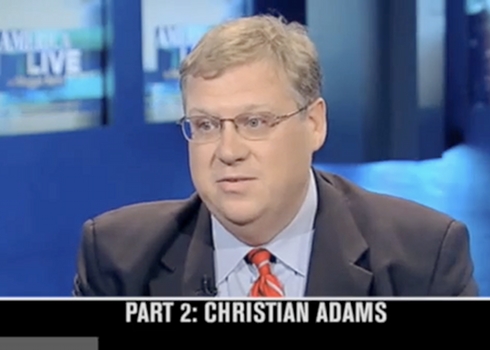J. Christian Adams, the former DOJ lawyer at the heart of the New Black Panthers case, has sent letter to 16 states warning them that they are breaking voter law by not removing dead and ineligible voters from their rolls.
“I’m just interested in compliance with Section 8,” Adams told TPMmuckraker yesterday, referring to the provision in the National Voter Registration Act — known as the “motor voter law” — which requires states to make a reasonable effort to remove ineligible voters from its registration lists.
“Voter fraud is not my concern,” Adams said. “My concern is compliance.”
It’s not uncommon for conservatives to bring up allegations of voter fraud just before an election, often leading to concerns that perfectly eligible voters may be barred from voting.
However, Adams — the whistleblower who testified to the Civil Rights Commission that the Obama DOJ has systematically chosen which cases to pursue based on the race of the defendants — says he is not one of those conservatives.
Voter fraud “exists, and anyone who denies it has no credibility,” he said. “But it doesn’t affect the outcome of elections as much as people say. I don’t think that if there’s 100 or 1,000 dead voters in, let’s say, Texas … I don’t think it’s going to affect the outcome of statewide elections.”
Asked why, then, pursue potential lawsuits under Section 8, Adams said, “Isn’t the law important? Compliance with federal law? That’s all it takes for me.”
In a Pajamas Media piece about his efforts, however, Adams did allege voter fraud.
“Some of the dead registered voters were resurrected on election day [in 2008] and cast ballots,” he said.
Adams took advantage of a provision in the NVRA which allows private citizens to notify state elections officials if they haven’t purged their rolls within 90 days of the primary or general election. If the states don’t fix the problem, a private citizen can sue.
Adams says he wouldn’t be the one to sue, if it comes to that. Fellow lawyers in each of the states, who would qualify as aggrieved parties, could sue instead.
He chose the 16 states by looking through the latest Election Assistance Commission report on the Motor Voter Act and picking out states which reported zero people removed from their rolls, or larger numbers of registered voters than residents over 18 — 19 states in all. He decided not to send a notice to Alaska (“under no circumstances am I going to Alaska this time of year”) or Michigan or Colorado, which are each dealing with separate Section 8 challenges.
The states he sent letters to: South Dakota, Texas, Mississippi, Kentucky, Indiana, West Virginia, Maryland, Iowa, North Carolina, Arkansas, Massachusetts, Oregon, Tennessee, Alabama, Rhode Island and Virginia.






